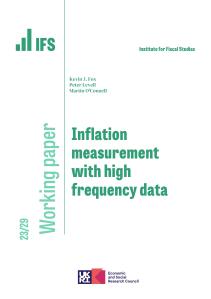Usually tax thresholds go up in line with inflation. But last year Chancellor Rishi Sunak announced a four-year freeze to income tax thresholds which, based on inflation forecasts at the time, was expected to represent an £8bn tax rise.
Since then, inflation has risen rapidly. Taking this into account, new analysis by researchers at IFS shows that the policy is now expected to be a £20.5bn tax rise.
This is on top of next month’s NICs rise (£13bn).
This underlines the danger with freezing thresholds for long periods: unexpected changes in inflation can make the policy much bigger or smaller than initially intended.
Tom Waters, a Senior Research Economist at IFS, said:
“Usually tax thresholds go up in line with inflation. Last March, when the Chancellor announced a four-year freeze in income tax thresholds, inflation was fairly low and so he expected it to raise about £8bn per year. Since then inflation has risen rapidly and is expected to rise even further, peaking at more than 8%. That means that the tax threshold freeze is now on track to be a £20.5bn tax hike – two and a half times what was originally expected. And this comes on top of the £13bn increase in National Insurance contributions slated for next month. This episode highlights the danger with setting tax thresholds in nominal terms for long periods of time – unexpected changes in inflation can make the size of a planned tax rise much bigger or smaller than expected.”









